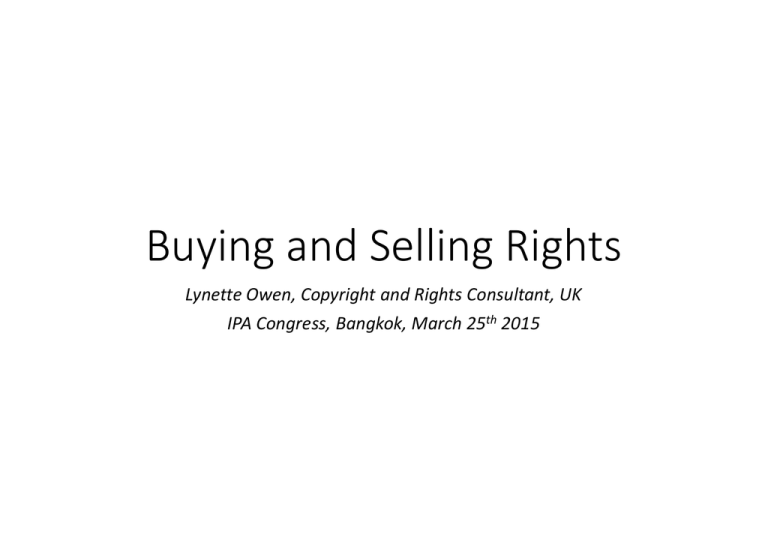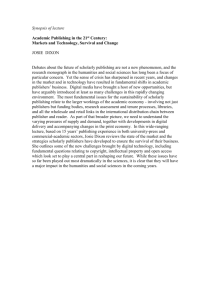Buying and Selling Rights - International Publishers Association
advertisement

Buying and Selling Rights Lynette Owen, Copyright and Rights Consultant, UK IPA Congress, Bangkok, March 25th 2015 Why buy rights? • To publish the work of a particular foreign author in your market • To access specialist content which may not be available from local authors, e.g. in medicine, business • To build your list more quickly • Hopefully, to publish profitably Key points for rights buying strategy • Identifying foreign publishers whose lists are compatible with your own • Studying publishing directories, foreign publishers’ catalogues and websites, plus market research at international book fairs • Aim to build long term relationships with publishing partners – preferably direct, but you may have to work via local subagent/s, particularly for rights in trade titles Which book fairs are best for rights trading? • Frankfurt, London and BookExpo America • Bologna is crucial for children’s books • Many other regional fairs – in Asia, Middle East, Eastern Europe, Latin America – much will depend on your target markets Who will you be dealing with? • Usually specialist rights sales staff within publishing houses – they will have detailed and direct knowledge of their own publications • Subagents may also represent titles from major foreign trade publishers, but they will be handling rights in books from many different publishers. They work on commission, so will be seeking the best deals What you need to do • Introduce your own publishing house and outline your specific areas of interest • If possible, give examples of any previous successful rights purchases • Present your company as a reliable licensing partner • Establish whether the foreign publisher or agent is offering titles on an exclusive option basis, or whether you are in a competitive situation – multiple submission or a full-scale auction • If the book is highly illustrated, could you join an international coedition where the original publisher would print copies for you? Negotiations and the licence contract • If negotiations proceed, the rightsholder will need to have details of your expected first print run and local retail price, proposed publication schedule and marketing plans. Terms may be calculated accordingly, but some rightsholders will wish to sell to the highest bidder. Licences are normally based on an advance against royalties on sales of the licensed edition • All details need to be discussed and agreed in advance: your proposed format/s (hardback, paperback, e-book), financial terms, applicable currency, publication schedule, any additional rights, duration of licence, any proposed local changes; availability and price of electronic files • Does the book contain any third party copyright material (quoted text or illustrations) for which permission needs to be recleared – if so, who will do the work and pay any fees? Building up the relationship • The first licence deal with a new contact may be the start of a good long-term partnership • Publish a high quality licensed edition on time, comply with the terms of the licence contract and use all your efforts to make your edition successful – this will encourage further business in the future Why sell rights? • To earn revenue for our author and your publishing house in addition to the income from sales of your own edition • To enhance the reputation of your author • Help maintain author loyalty to your publishing house • Establish your own publishing house as an international player Some possible hurdles • English language publishers have a major advantage in that they use a language which is widely understood in many other countries – foreign partners can assess initial information provided in English, and it is usually possible to find suitable translators from English into the local language • Books written in less familiar languages may appear to be an obstacle for foreign publishers • Even books which have proved very successful in your own market may be difficult to promote; the author may not be widely known, and the book may be perceived as too local in appeal So what can you do? • Study your list and be very selective in pinpointing those titles which may have real international appeal • Prepare BRIEF information on those key titles in English – this will be accessible to publishers in many countries • Also consider preparing a short sample of the text translated into English Prioritise your target markets • If you are new to selling rights, you cannot tackle the whole world at once – consider carefully which language markets are most important to you – English? French? German? Italian? Portuguese? Spanish? • Or perhaps markets closer to home in Asia – Korean? Japanese? Chinese – simplified and complex characters? Vietnamese? Bahasa Indonesian? Bahasa Malaysian? Market research • Study publishing directories, foreign publishers’ catalogues and websites, and undertake market research at book fairs after studying the fair directory and website • You may also receive recommendations from potential translators • It may be worth subscribing to key book trade journals e.g. Publishers Weekly for the USA, The Bookseller for the UK Making the first contact • Your contacts will be commissioning editors, not specialist rights staff; names may be available on their company website • If making contact by mail or e-mail, introduce your company and supply BRIEF information on the projects/s you want to offer – but do not offer too many, as overkill is offputting • Clarify if sample text might be available in their language, or if you could supply a full draft translation if a deal goes ahead • If seeking to meet at a book fair, make contact at least 10-12 weeks ahead of the fair to request an appointment, making it clear you want to discuss SELLING rather than BUYING rights At a book fair • Assume no meeting will be more than half an hour, at the stand of the potential partner; a chance to establish their key interests • Take a good supply of brief information sheets on each project you want to offer, preferably in English • If book is heavily illustrated, copies of sample illustration material (you can show on an iPad, but an interested publisher may want material which they can take away). Can you print copies for them as a coedition? • Consider how you want to offer rights (exclusive option, multiple submission or auction – the latter technique is unwise if you are new to selling rights). For languages spoken in more than one market (e.g. English, Spanish, Portuguese) do you want one global licensee, or to split the markets? Cold calling • Sometimes you may find the stand of a publishers whose books appear to be a good match with yours • Try to secure an appointment on the spot, but be aware this may not be possible • Try to establish why: their schedule is too full? The appropriate editor is not present? They never buy rights? • If it seems worthwhile to follow up, obtain contact details for relevant editor After the fair • Follow up promptly and confirm the status of any titles in which they expressed interest – when they can expect to receive material, whether they have an option etc • Even if they were not interested in what you had to offer, thank them for their time and note their specific interests for the future Negotiating terms • Take their expected sales territory, print run and local price into account when calculating terms – be realistic • Most deals are done on the basis of an advance against royalties on sales – royalty may be calculated on retail price less any VAT, or on net receipts. Royalties for e-book rights (on net receipts) will be higher than for print edition • Many western publishers will want extra subsidiary rights, e.g. the right to sublicense within their territory, serial rights to newspapers etc: you should receive a share of any such additional revenue • Can you supply digital files if they are manufacturing their own edition? • Could you provide a full draft translation if they would have problems finding their own translator (this would be paid for separately from the licence agreement)? And finally…… • Don’t be discouraged – not every book has rights potential • Aim to build up long-term partnerships – but this will take time Questions? • Contact: lynetteowen@hotmail.co.uk • Useful books: Selling Rights, 7/e (2014, Routledge, ISBN 978-0-415-83564-0) Clark’s Publishing Agreements: A Book of Precedents, 9/e (2013, Bloomsbury Professional, ISBN 978-1-78043-220-5)


